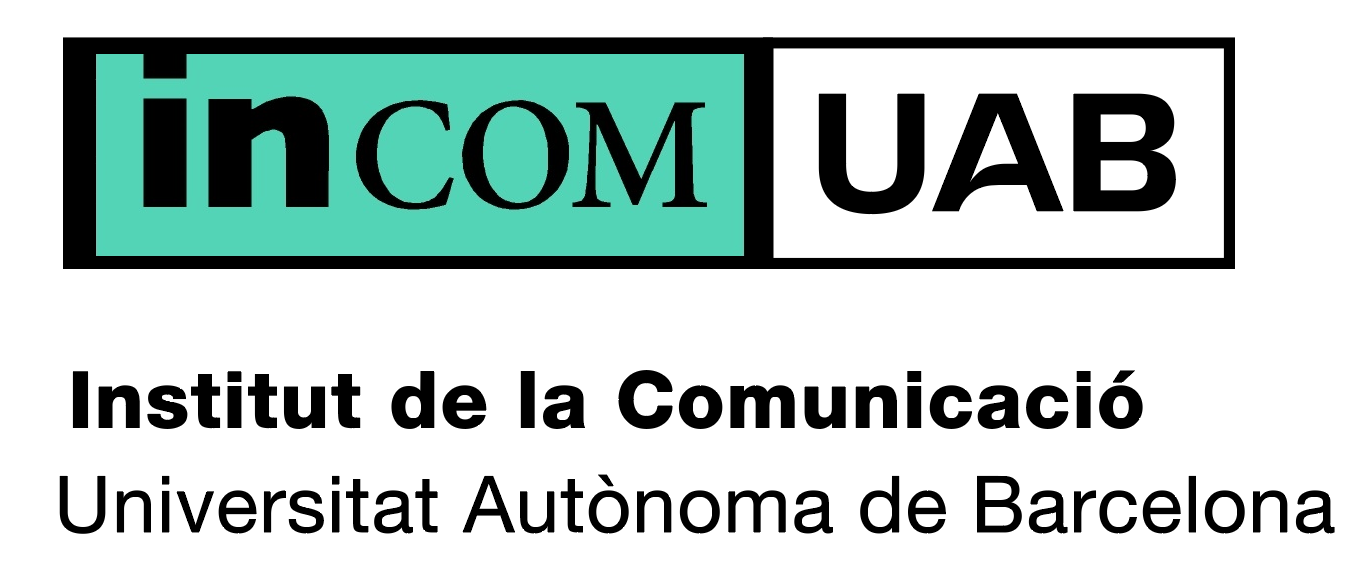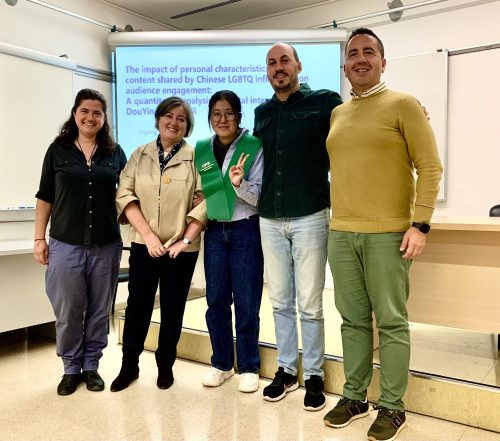Yan Tingting va defensar la seva tesi doctoral, titulada “The impact of personal characteristics and content shared by Chinese LGBTQ influencers on audience engagement: A quantitative analysis of digital interaction in DouYin and BiliBili”, el passat 28 d’octubre, al marc del programa de doctorat en Comunicació Audiovisual i Publicitat de la Universitat Autònoma de Barcelona. La recerca va estar dirigida per la Dra. Amparo Huertas i s’inclou dins de les aportacions de la Càtedra UNESCO de Comunicació, de la que també és responsable.
L’estudi aporta evidències empíriques sobre els mecanismes de la comunicació persuasiva en entorns digitals. La investigació analitza el treball dels influencers LGBTQ a les xarxes socials xineses DouYin i BiliBili i la seva repercursió en termes d’interacció digital, tenint en compte com a variables d’anàlisi la seva personalitat i el contingut dels videos compartits. Els resultats mostren que l’expertesa i l’atractiu dels influencers incrementen la interactivitat digital, mentre que la confiança no té un impacte significatiu.
El tribunal avaluador estava format pel Dr. Adolfo Carratalá (Universidad de Valencia), la Dra. Lídia Arroyo (Universitat Autònoma de Barcelona) i el Dr. Rafael Ventura (Universitat de Lleida). El tribunal va valorar la valentia de fer un treball sobre la comunitat LGTBQ a Xina, així com també la honestat i transparència del procés metodològic.
Fotografia: Lídia Arroyo, Amparo Huertas, Yan TingTing, Rafael Ventura i Adolfo Carratalá (d’esquerra a dreta)
ABSTRACT:
This study explores the influence of LGBTQ social media influencers (SMIs) on audience engagement and attitudes towards the LGBTQ communities in China. Despite China having one of the world’s largest LGBTQ populations, social visibility and acceptance remain limited. This study elaborates the history and digital culture of LGBTQ in the Chinese context. The history of LGBTQ in China is divided into three parts: the history of LG communities, brief notes on transgenderism and brief notes on queer. The social media and LGBTQ communities part talks about the evolution of internet and LGBTQ online activity in China.
The theoretical framework focuses on four parts: cultural consumption, social media, social media influencers and audience reception. The social media part includes positive aspects of social sociability (social connection and social support) , and social media and citizenship (civic debate, social media as a democratic public sphere, homonormativity and public debate, and algorithms and audiences). The social media influencers part includes definition, characteristics, function, the source credibility model (trustworthiness, expertise, and attractiveness) and persuasive communication. The audience reception part talks about uses and gratifications theory and audience engagement. Based on these theories, this research investigates how LGBTQ SMIs personal characteristics (trustworthiness, expertise, and attractiveness) and video content (humor and title) shape audience reactions (likes, shares, comments, views, and favorites).
A quantitative analysis was conducted on 100 top-performing videos from 10 prominent LGBTQ SMIs on DouYin and Bilibili, alongside 100,000 user comments from the 1st of October in 2023 to 1st of January in 2024. Regression analysis and Python-based data collection were used to measure interactions (views, likes, shares, comments, favorites) and sentiment in 100,000 comments.
The findings of the study indicate the personal characteristics of SMIs indeed have a positive relationship with audiences’ interaction. SMI expertise significantly enhance audience interaction, particularly views, while attractiveness exhibits a U-shaped relationship with user response, initially suppressing but later boosting interaction. Attractive SMIs increased views, but not affect audiences’ shares, likes, saves, views and comments significantly. Surprisingly, trustworthiness doesn’t significantly impact audience behavior, but SMI with credibility also generates significantly higher audience engagement (especially comments, shares, favorites).
The findings of the study also show the videos content of SMIs indeed have a positive relationship with audiences’ interaction. Humorous themes have a significant and positive effect on user response, showing that more humorous video could attract more attention of audiences and encourage more audience interaction. In addition, title length also affects on user response significantly, but it shows an inverted “U-shaped” relationship with user response.
Finally, this research also confirms the theme’s positive effect on audiences engagement. Among them, the Couple theme dominated (29%), featuring romantic relationships (e.g., Niehuliucheng’s viral couple video with 2.48M likes). Life content followed (26%), showcasing everyday experiences (e.g., Zuiyingdejienig’s New Year vlog). Beauty (13%) and Humor (6%) were notable, while Professional (2%) and Travel (4%) were niche. “Others” (17%) covered diverse themes like Daamaojun’s life-education video (6.8M views). The Couple theme has the highest views/likes/comments. The Beauty has top shares/saves. The Humor theme has strong shares/comments. The Professional/Travel theme have the lowest engagement.
Concerning the relationship between theme and comment sentiment, the Couple and Life themes receive the most comments but also high negativity, reflecting polarized reactions. The Others theme has a negative skew, suggesting controversial content. The Beauty theme enjoys overwhelmingly positive feedback, while the Humor theme is divisive. The Professional and Talk themes yield minimal interaction, whereas the Travel theme has exclusively positive comments, likely due to its universal appeal.
About the relationship between title length and audiences engagement, 70% of SMIs prefer long-form titles, using subtitles, descriptive phrases, or tags to boost engagement (e.g., “The roommate’s unmoving challenge|It turned out to be a fight between handsome guys?”). Only 30% use short tags (e.g., “Summer”), which provide less information. In terms of views, long titles with context/humor perform best (e.g., “There are so many experts…”: 150M vs. “Snow mountain record”: 5M). In terms of likes, it has no correlation with title length and it depends on content/SMI appeal (e.g., ZhiBo’s videos consistently exceed 1M likes). In terms of shares, long, relatable titles or short viral hashtags succeed (e.g., “What other live-streaming…?”: 820K vs. “Summer”: 200K). In terms of comments, open-ended long titles (“Can you tell me the logic?”: 41K) or ambiguous short titles (“Yes?…”: 7K) drive engagement. In terms of saves, utility-focused long titles (“How to improve writing…”: 66K) or aesthetic short titles (“Before sunset…”: 6K) perform well.
The research contributes to persuasive communication theory by confirming that SMIs could shape audience attitudes and behavior, and sentiment analysis shows LGBTQ SMIs influence perceptions through personal traits and content. It also validates the source credibility model by proving SMI expertise and attractiveness could positively impact audience reactions. In addition, audience engagement has been verified as results shows content themes (humor theme) and title length significantly affect engagement metrics (views, likes, etc.). However, the research has some contradictions with theoretical framework. SMI trustworthiness did not significantly influence responses, challenging Navarro’s theory. Algorithmic audience behavior also questioned traditional uses and gratifications theory.
Limitations include: (1) Data collection constraints—asynchronous gathering risks missing deleted content, while API restrictions (DouYin/BiliBili) impose narrow time windows and daily quotas. (2) Sample bias—focus on top 10 LGBTQ SMIs (by followers/engagement) limits generalizability, omitting smaller creators. (3) Algorithmic volatility—dynamic content filtering, computational categorization, and shifting visibility logics challenge data accuracy and timeliness. (4) Preliminary scope—findings on SMI-audience dynamics and gender identity lack prior empirical grounding; online-offline behavior disparities and unmeasured cultural complexities further constrain generalizability.
Keywords: LGBTQ; social media influencer; digital interaction; audience engagement

